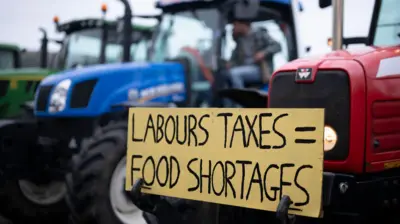We've updated our Privacy and Cookies Policy
We've made some important changes to our Privacy and Cookies Policy and we want you to know what this means for you and your data.
'Leadership' needed from UK to protect aid workers, say MPs
Image source, Reuters
A group of MPs has called for "strong leadership" from the UK to better safeguard aid and healthcare workers from harm.
Last year, there were 126 deaths as a result of violence against aid workers, according to figures cited by the International Development Committee.
Chairman Stephen Twigg MP said "a growing trend of attacks" was putting humanitarian efforts at risk.
The government said "one attack is one too many" and it was taking action.
cites figures from the Aid Worker Security Database, which recorded 221 separate incidents of violence against aid workers in 2018, resulting in 126 deaths and 143 injuries.
In the same year, across 23 countries, there were 973 recorded attacks on healthcare personnel and facilities. The Safeguarding Health in Conflict Coalition believes attacks resulted in 167 fatalities and at least 710 injuries.
Of the three nations with the highest number of attacks, South Sudan has chiefly witnessed shootings and assault, Syria air strikes and Afghanistan kidnappings, said the select committee.
The report added that measures to mitigate risks to humanitarian and health workers and facilities, "inevitably impose costs, diverting resources".
Threats and attacks were putting aid and healthcare missions at risk, the MPs continued.
They pointed towards violence in the Democratic Republic of Congo, for example, which they said was jeopardizing global efforts to contain and stop the spread of Ebola.
Mr Twigg said it was "unacceptable" for aid and healthcare workers to continue to put their lives on the line, without "much greater support from the international community".
Prolonged misery
Humanitarian and charity organisations have echoed calls for better protection.
The International Committee of the Red Cross - who gave evidence to the committee - said there were steps all governments could take to lessen the risk to aid workers in conflict zones, and it was the responsibility of all states to ensure that international humanitarian law was "strictly adhered" to.
"By targeting aid workers, warring parties deprive civilian populations of the aid they desperately need and prolong misery and suffering," said Helen Alderson, the humanitarian organisation's head in the UK.
Oxfam GB also welcomed the report, adding that it was "vital" the impartiality of aid workers was respected.
Save the Children called on the government to "adopt an ambitious new approach that puts the protection of children in conflict at its heart".
Image source, AFP
A Department for International Development spokesman said "the UK strongly condemns the appalling targeting of brave aid workers who risk their lives to save others."
"We are already taking action to better protect aid workers by helping to improve security practices across the aid sector, raise safety standards and gather evidence to understand how to prevent future attacks."
Last year, the UK supported a UN , condemning attacks by armed groups in the DR Congo and their role in exacerbating the country's ongoing Ebola outbreak.
In 2016, the UK also supported a security council condemning attacks on medical personnel.
The government said it was closely examining the recommendations made in the report and would provide a full response in due course.
The UN has estimated that worldwide are in acute humanitarian need; most of them because of armed conflict.
Top Stories
More to explore
Most read
Content is not available








